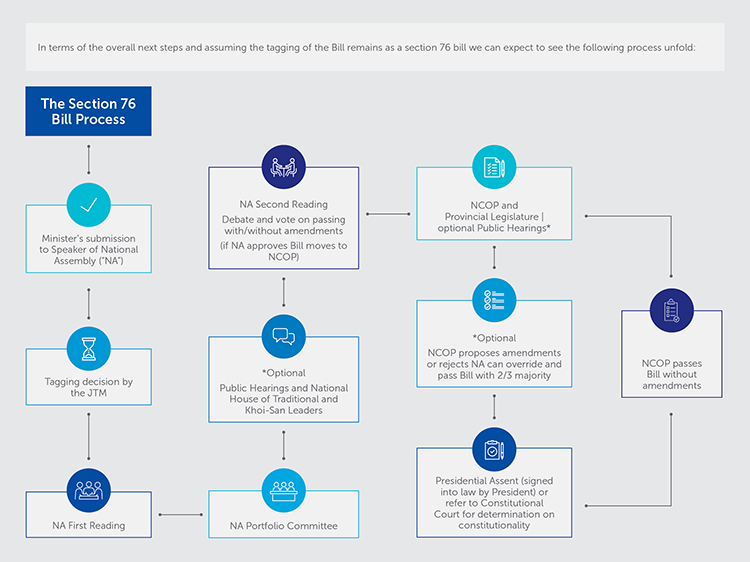Second debut for the Upstream Petroleum Resources Development Bill, 2021, as the parliamentary journey begins
At a glance
- The Upstream Petroleum Resources Development Bill, which proposes separate regulation for the oil and gas sector, has been published after a long wait since December 2019.
- The bill has been tagged as a section 76 bill, requiring consideration by both the National Assembly and the National Council of Provinces, and it may also affect traditional or Khoi-San communities.
- The timeline for enactment is uncertain, as the bill must go through various parliamentary processes, including potential public hearings and a review by the Constitutional Court, before being submitted to the President for approval.
The Bill, in its simplest decryption, proposes a separation which will allow the young and budding hydrocarbon exploration and production sector to be regulated entirely separately from the mining sector in South Africa. On its first debut, written submissions from industry stakeholders were required by 21 February 2020. Government consultations on these submissions were conducted by the Department of Mineral Resources and Energy (DMRE) and the Petroleum Agency (Task Team) between April and May 2020. During September 2020 the Task Team verbally presented its proposed amendments to the Bill to industry stakeholders, most of which sought to address the concerns of raised.
Almost 18 months have passed since the Bill first debuted on Christmas eve in 2019 – it’s been a long wait for the industry and one riddled with uncertainty – until now.
The wait finally ended on Monday 14 June 2021, when an official iteration of the Bill was published on the website of the Parliamentary Monitoring Group. This immediately after the Minister of Mineral Resources and Energy, in an explanatory summary published in the Government Gazette last Friday, declared his intent to introduce the Bill to the National Assembly.
A copy of the Bill can be accessed here.
As the Bill begins its parliamentary journey, notable at this stage is that the State Law Advisers and DMRE have proposed that:
- The Bill be tagged as a section 76 bill. A section 76 bill is an “ordinary bill affecting the provinces” which means it must be considered in both the National Assembly and the National Council of Provinces and evaluated by each provincial legislature.
- The Bill be referred to the National House of Traditional and Khoi-San Leaders for consideration since its provisions may directly affect traditional or Khoi-San communities.
- The Bill does not relate to any matter referred to in section 154(2) of the Constitution, in that it is not national or provincial legislation that affects the status, institutions, or functions of local government and therefore the section 154(2) process is not applicable.
In terms of immediate next steps, a decision on the classification of the Bill, as a section 76 bill, will now be taken by the Joint Tagging Mechanism (JTM). The process of classifying the Bill into one of the four categories is called “tagging” and this determines the parliamentary process to be navigated toward the enactment the Bill. The JTM committee comprises the Speaker and the Deputy Speaker of the National Assembly and the Chairperson and Permanent Deputy Chairperson of the National Council of Provinces. The JTM is required to decide on the appropriate tagging of the Bill as a section 76 bill by consensus.

Given the multifaceted nature of the parliamentary process and the optionality on public hearings it is difficult to predict when the Bill will be enacted with any measure of certainty. Once the Bill has passed through both the National Assembly and the National Council of Provinces, it will be translated into one other official language and submitted to President’s Office by the Bills Office. The President then has the option to refer the Bill to the Constitutional Court for a decision on its constitutionality, should he have any concerns in this regard. Investors should therefore brace for a “long-haul”, but if the end result is a well-balanced and pragmatic legislative landscape for upstream investment, then the initial discomfort will ultimately be outweighed, by the long-term benefits.
The information and material published on this website is provided for general purposes only and does not constitute legal advice. We make every effort to ensure that the content is updated regularly and to offer the most current and accurate information. Please consult one of our lawyers on any specific legal problem or matter. We accept no responsibility for any loss or damage, whether direct or consequential, which may arise from reliance on the information contained in these pages. Please refer to our full terms and conditions. Copyright © 2026 Cliffe Dekker Hofmeyr. All rights reserved. For permission to reproduce an article or publication, please contact us cliffedekkerhofmeyr@cdhlegal.com.
Subscribe
We support our clients’ strategic and operational needs by offering innovative, integrated and high quality thought leadership. To stay up to date on the latest legal developments that may potentially impact your business, subscribe to our alerts, seminar and webinar invitations.
Subscribe




